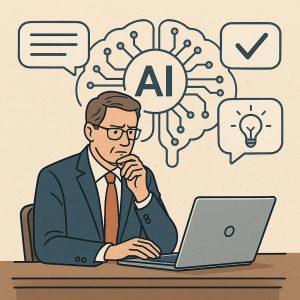Dr Aruna Dayanatha PhD

In today’s high-pressure corporate world, leaders and professionals are expected to make swift, high-stakes decisions while navigating a flood of information. Yet, as competition intensifies, stress often undermines one of the most critical assets for success: the ability to dive deeply into one’s knowledge system—the vast mental architecture of categories, experiences, archived expertise, and strategies for finding new information.
Cognitive scaffolding offers a powerful approach to protect and even enhance that capacity, especially in competitive environments where knowledge agility is a differentiator.
The Stress–Knowledge Connection
Stress changes the way the brain processes and retrieves information. In calm states, individuals can efficiently tap into their mental category system (the structures that organize their knowledge), archived knowledge (the stored expertise accumulated over years), and search capabilities (methods for discovering new insights).
In competitive environments, however, stress triggers physiological and psychological responses that can cause:
- Narrowed attention and tunnel vision.
- Difficulty connecting abstract concepts across domains.
- Reduced working memory capacity.
- Shortened time horizons in decision-making.
This means that even the most capable executives may find themselves unable to fully leverage what they know, simply because the cognitive channels are blocked by the pressure to perform.
Cognitive Scaffolding as a Performance Multiplier
Cognitive scaffolding is the deliberate creation of external supports that reduce the mental load of processing and retrieval. Instead of relying solely on internal recall and mental computation, leaders use structured aids to free up mental bandwidth for high-value thinking.
These scaffolds can take many forms:
- Knowledge maps and frameworks to navigate complex decisions.
- Checklists and decision trees to ensure critical factors aren’t overlooked.
- Prompting tools (including AI) to expand thinking pathways.
- Cross-domain analogies to stimulate innovative solutions.
By reducing the stress-induced bottleneck in knowledge access, scaffolding allows leaders to make better, faster, and more creative decisions even in high-pressure situations.
The Role of Conversational AI
One of the most transformative scaffolding tools now available is conversational AI. In a competitive environment, AI acts as a knowledge exploration partner that can:
- Surface archived insights in real time.
- Help categorize and connect disparate ideas.
- Guide structured exploration of unfamiliar territories.
- Offer alternative perspectives or domain analogies instantly.
The shift here is profound: AI moves from being a passive tool to an active cognitive ally. Rather than forcing leaders to manually navigate stress-heavy cognitive processes, it provides real-time scaffolding that keeps knowledge systems fluid and accessible.
A New Leadership Concept: Adaptive Cognitive Augmentation
The integration of AI into competitive knowledge work isn’t just a technological change—it’s the emergence of a new leadership paradigm we can call Adaptive Cognitive Augmentation.
This concept frames AI not as a replacement for human expertise but as a dynamic partner that:
- Expands Cognitive Reach – allowing leaders to go deeper into their mental and organizational knowledge systems without being constrained by stress.
- Increases Decision Velocity – enabling faster synthesis of complex information.
- Maintains Creative Breadth – countering stress-induced narrowing of thought.
Leaders who embrace Adaptive Cognitive Augmentation position themselves—and their organizations—to thrive in environments where speed, adaptability, and knowledge leverage are decisive competitive factors.
Implications for Leaders in Competitive Markets
For executives in high-stakes industries, this approach is more than an operational improvement—it’s a strategic advantage. By consciously designing cognitive scaffolds and embedding AI as a thought partner, leaders can:
- Preserve clarity under intense pressure.
- Unlock deeper layers of organizational intelligence.
- Outpace competitors in innovation and decision-making.
In short, the future of leadership in competitive environments belongs to those who master the art of scaffolding human cognition with intelligent systems.
